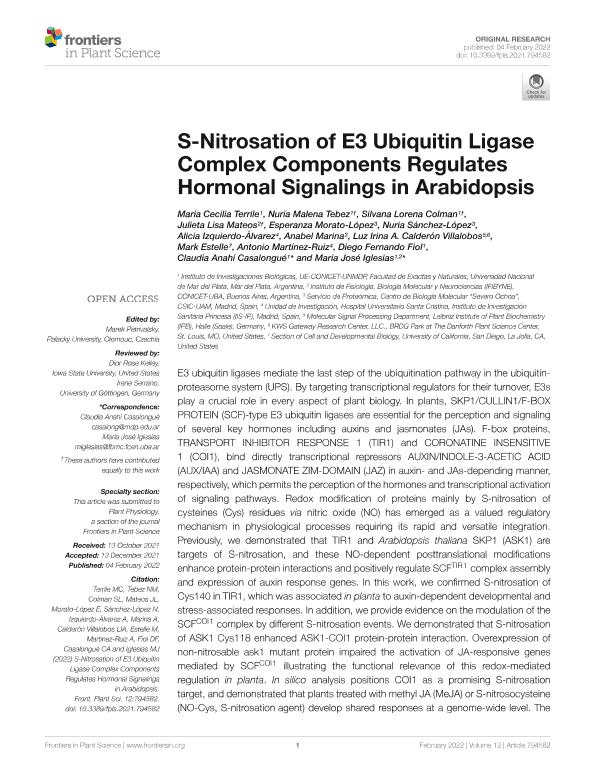Artículo
S-Nitrosation of E3 Ubiquitin Ligase Complex Components Regulates Hormonal Signalings in Arabidopsis
Terrile, Maria Cecilia ; Tebez, Nuria Malena
; Tebez, Nuria Malena ; Colman, Silvana Lorena
; Colman, Silvana Lorena ; Mateos, Julieta Lisa
; Mateos, Julieta Lisa ; Morato López, Esperanza; Sánchez López, Nuria; Izquierdo Álvarez, Alicia; Marina, Anabel; Calderón Villalobos, Luz Irina A.; Estelle, Mark; Martínez Ruiz, Antonio; Fiol, Diego Fernando
; Morato López, Esperanza; Sánchez López, Nuria; Izquierdo Álvarez, Alicia; Marina, Anabel; Calderón Villalobos, Luz Irina A.; Estelle, Mark; Martínez Ruiz, Antonio; Fiol, Diego Fernando ; Casalongue, Claudia
; Casalongue, Claudia ; Iglesias, María José
; Iglesias, María José
 ; Tebez, Nuria Malena
; Tebez, Nuria Malena ; Colman, Silvana Lorena
; Colman, Silvana Lorena ; Mateos, Julieta Lisa
; Mateos, Julieta Lisa ; Morato López, Esperanza; Sánchez López, Nuria; Izquierdo Álvarez, Alicia; Marina, Anabel; Calderón Villalobos, Luz Irina A.; Estelle, Mark; Martínez Ruiz, Antonio; Fiol, Diego Fernando
; Morato López, Esperanza; Sánchez López, Nuria; Izquierdo Álvarez, Alicia; Marina, Anabel; Calderón Villalobos, Luz Irina A.; Estelle, Mark; Martínez Ruiz, Antonio; Fiol, Diego Fernando ; Casalongue, Claudia
; Casalongue, Claudia ; Iglesias, María José
; Iglesias, María José
Fecha de publicación:
01/2022
Editorial:
Frontiers Media
Revista:
Frontiers in Plant Science
ISSN:
1664-462X
Idioma:
Inglés
Tipo de recurso:
Artículo publicado
Clasificación temática:
Resumen
E3 ubiquitin ligases mediate the last step of the ubiquitination pathway in the ubiquitin-proteasome system (UPS). By targeting transcriptional regulators for their turnover, E3s play a crucial role in every aspect of plant biology. In plants, SKP1/CULLIN1/F-BOX PROTEIN (SCF)-type E3 ubiquitin ligases are essential for the perception and signaling of several key hormones including auxins and jasmonates (JAs). F-box proteins, TRANSPORT INHIBITOR RESPONSE 1 (TIR1) and CORONATINE INSENSITIVE 1 (COI1), bind directly transcriptional repressors AUXIN/INDOLE-3-ACETIC ACID (AUX/IAA) and JASMONATE ZIM-DOMAIN (JAZ) in auxin- and JAs-depending manner, respectively, which permits the perception of the hormones and transcriptional activation of signaling pathways. Redox modification of proteins mainly by S-nitrosation of cysteines (Cys) residues via nitric oxide (NO) has emerged as a valued regulatory mechanism in physiological processes requiring its rapid and versatile integration. Previously, we demonstrated that TIR1 and Arabidopsis thaliana SKP1 (ASK1) are targets of S-nitrosation, and these NO-dependent posttranslational modifications enhance protein-protein interactions and positively regulate SCFTIR1 complex assembly and expression of auxin response genes. In this work, we confirmed S-nitrosation of Cys140 in TIR1, which was associated in planta to auxin-dependent developmental and stress-associated responses. In addition, we provide evidence on the modulation of the SCFCOI1 complex by different S-nitrosation events. We demonstrated that S-nitrosation of ASK1 Cys118 enhanced ASK1-COI1 protein-protein interaction. Overexpression of non-nitrosable ask1 mutant protein impaired the activation of JA-responsive genes mediated by SCFCOI1 illustrating the functional relevance of this redox-mediated regulation in planta. In silico analysis positions COI1 as a promising S-nitrosation target, and demonstrated that plants treated with methyl JA (MeJA) or S-nitrosocysteine (NO-Cys, S-nitrosation agent) develop shared responses at a genome-wide level. The regulation of SCF components involved in hormonal perception by S-nitrosation may represent a key strategy to determine the precise time and site-dependent activation of each hormonal signaling pathway and highlights NO as a pivotal molecular player in these scenarios.
Palabras clave:
ARABIDOPSIS THALIANA
,
AUXIN
,
JASMONATES
,
S-NITROSATION
,
SCF E3 UBIQUITIN LIGASE
Archivos asociados
Licencia
Identificadores
Colecciones
Articulos(IIB)
Articulos de INSTITUTO DE INVESTIGACIONES BIOLOGICAS
Articulos de INSTITUTO DE INVESTIGACIONES BIOLOGICAS
Citación
Terrile, Maria Cecilia; Tebez, Nuria Malena; Colman, Silvana Lorena; Mateos, Julieta Lisa; Morato López, Esperanza; et al.; S-Nitrosation of E3 Ubiquitin Ligase Complex Components Regulates Hormonal Signalings in Arabidopsis; Frontiers Media; Frontiers in Plant Science; 12; 1-2022; 1-14
Compartir
Altmétricas



